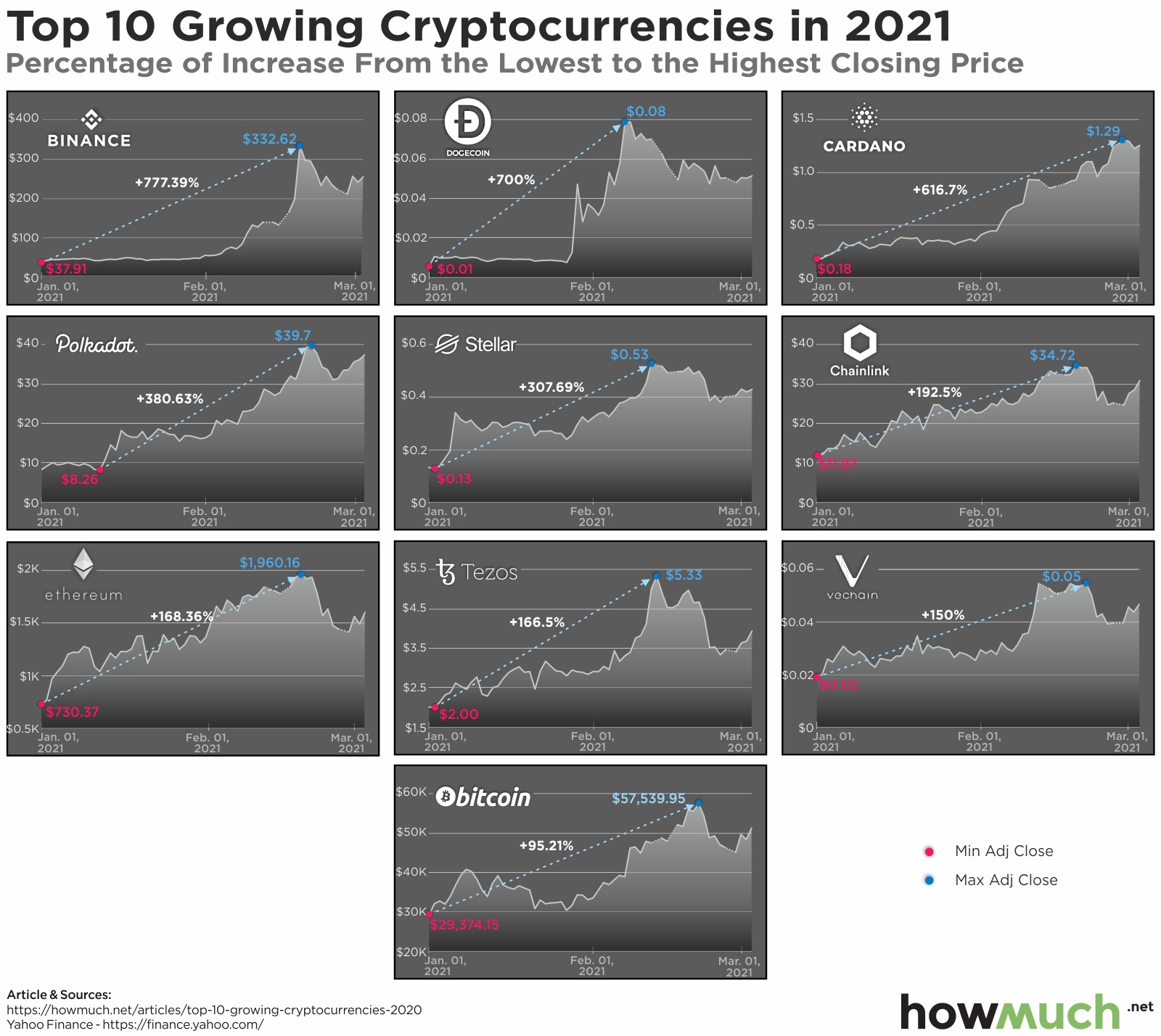Cryptocurrencies saw their values soar in 2021. Big companies like Paypal dove into the market, creating greater access. Demand skyrocketed alongside equity markets as troves of new investors snatched up various cryptocurrencies. And surprisingly, Bitcoin wasn’t the top performer.

- A significant amount of the gains occurred alongside the ‘Gamestop’ mania as investors and traders poured into risk assets.
- The price of little-known cryptocurrencies like Dogecoin and Binance experienced a surge in a relatively short amount of time (days to weeks instead of months).
- Companies like Tesla investing $1.5 billion in Bitcoin for payments fueled demand.
- Many of the smaller coins still trade near or below $1 per coin.
Cryptocurrencies act much like stocks. You buy at one price, sell at another, at the difference is your profit. Using Yahoo Finance, our data looks at the percentage gain in the price of each cryptocurrency from the beginning of 2021 until the present. We then plot their price charts for 2021 from top left to bottom right in order of the largest percentage gains.
Top 10 Cryptocurrencies Percentage Gains in 2021
1. Binance: +777.39%
2. Dogecoin: +700%
3. Cardano: +616.7%
4. Polkadot: +380.63%
5. Stellar: + 307.69%
6. Chainlink: +192.5%
7. Ethereum: +168.36%
8. Tezos: +166.5%
9. Vechain: +150%
10. Bitcoin: +95.21%
A simple tweet from Elon Musk sent shares of Dogecoin up double-digit percentages in a single day. And this cryptocurrency was started as a joke in 2013. Each cryptocurrency emerged for different reasons. And its worth understanding those to get a sense of where their value comes from.
Binance
Binance is the cryptocurrency that operates the Binance Exchange, one of the most widely used in the world. Using the ‘token’ as a method of payment on the exchange can trade at a discount.
Dogecoin
Originally created as a joke, Dogecoin garnered attention with its meteoric rise in price and associated memes. While most currencies continue to create coins over time, Dogecoin put a cap on the total number of coins ever available in circulation.
Cardano
Engineers, mathematicians, and cryptographers created Cardano using a research-based approach. They wanted to create a better version of Etherium as well as create solutions for chain interoperability, voter fraud, and legal contract tracing. While much smaller than Etherium, Cardano gained some notable investments lately.
Polkadot
Miners of Bitcoin often sell their reward coins, creating downward pressure on Bitcoins. Polkadot uses a ‘Proof of Stake’ concept to avoid this issue by attributing the mining power to the proportion of coins held by the miner, essentially disincentivizing their sale. This avoids a potential ‘Tragedy of Commons’ problem that exists in Bitcoin’s future.
Stellar
Not all cryptocurrencies are aimed at the retail audience. Stellar’s blockchain network is designed to connect financial institutions for large transactions. This specific blockchain works to reduce the transaction time from several days across many intermediaries to near-instantaneous movement.
Chainlink
Oracle decided to get into the game with Chainlink, a cryptocurrency designs to bridge the gap between smart contracts (like Ehterium) and outside data. Chainlink provides some interesting use cases including water supply monitoring.
Etherium
One of the most well-known Bitcoin alternatives, Etherium is a decentralized software platform enabling Smart Contracts. They aimed to deliver a decentralized suite of financial products for anyone in the world with free access. Etherium is the second-largest digital currency next to Bitcoin by market cap.
Tezos
After several early cryptocurrencies split, Tezos set out to create a ‘self-amending blockchain.’ Their idea was to allow anyone who owned their cryptocurrency to vote on possible changes to its rules. That moves the decisions out of the hands of developers and into the owners.
VeChain
Aimed at enhancing the supply chain management, VeChain contains two tokens: VeChain Token and VeChainThor Energy. The first transfers value across the network while the second powers the smart contracts themselves.
Bitcoin
The most well-known cryptocurrency out there, Bitcoin’s origin is a bit of a mystery. It’s the first currency with no physical coins, where transactions are governed by a consensus of participants that add approve of a transaction and add it to the ledger. Unlike government currencies, Bitcoin is operated by this decentralized structure.
Cryptocurrencies already saw one bubble cycle several years ago. Are we headed for another one now or are we at the precipice of a new age of digital currencies? Let us know your thoughts below.
Data: Table 1.1